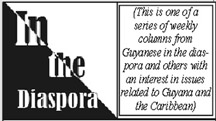Hilbourne A. Watson is Professor of International Relations at Bucknell University, Lewisburg, Pennsylvania
By Hilbourne Watson
In a follow up article, “Kick CARICOM to the Kerb” (Part 2), carried in the Jamaica Gleaner, May 19, Ronald Mason continues his diatribe against regional integration to justify his belief that Jamaica should leave CARICOM. Mason is entitled to his opinion; however he is not free to select his facts to attribute to CARICOM problems arising from how Jamaica and the Caribbean participate in global capitalism. Mason misrepresents Jamaica’s relationship with Trinidad and the OECS and why he believes the Revised Treaty of Chaguaramas disadvantages Jamaica, while disregarding Jamaica’s unfavorable economic relationship with major trading partners like the US, the EU, and Canada. Unevenness is inherent in the capitalist organization of the global economy as reflected in the EU and NAFTA. For example. Germany dominates the EU and the working classes in the UK, Spain, Greece, and Central European countries are forced to bear the heavy burden of austerity combined with low growth, high per capita debt and unemployment associated with the global economic and financial crisis. Parallels exist in all CARICOM societies from Belize and Jamaica to Guyana.
 I think we ought to clear the air on matters such as the responsibility for the collapse of the Federation of the West Indies. Before the end of World War II Britain recognized that it was incapable of maintaining its far-flung empire, and began, with United States (US) prodding, to manage the dissolution of the British Empire in a responsible and “orderly” fashion that would not threaten US interests in the Caribbean. Beginning in 1947-48, plans were being laid to federate the British West Indies (BWI) however there were two competing visions of federation. On the one hand, coming out of the Caribbean Labor Congress (CLC), which met in Barbados in 1945, the BWI labor delegates had resolved that only a strong socialist Caribbean Commonwealth could rescue the BWI from the conditions that had triggered the 1937 working class rebellion. They thus assembled at Montego under full British supervision to work out plans for a labor and working class-based federation in 1947-1948. On the other hand the British colonial authorities and the US wanted nothing to do with such a federal initiative. They preferred a federation with a weak central government in which strong working class institutions would have no important role. The outlines of the Anglo-American plan were evident in the decisions of the Anglo-American Caribbean Commission meeting held in the US Virgin Islands in 1944. The US objected to the integration of BWI colonies leading to an independent (sovereign) West Indian nation with a strong working class regional economic and political component.
I think we ought to clear the air on matters such as the responsibility for the collapse of the Federation of the West Indies. Before the end of World War II Britain recognized that it was incapable of maintaining its far-flung empire, and began, with United States (US) prodding, to manage the dissolution of the British Empire in a responsible and “orderly” fashion that would not threaten US interests in the Caribbean. Beginning in 1947-48, plans were being laid to federate the British West Indies (BWI) however there were two competing visions of federation. On the one hand, coming out of the Caribbean Labor Congress (CLC), which met in Barbados in 1945, the BWI labor delegates had resolved that only a strong socialist Caribbean Commonwealth could rescue the BWI from the conditions that had triggered the 1937 working class rebellion. They thus assembled at Montego under full British supervision to work out plans for a labor and working class-based federation in 1947-1948. On the other hand the British colonial authorities and the US wanted nothing to do with such a federal initiative. They preferred a federation with a weak central government in which strong working class institutions would have no important role. The outlines of the Anglo-American plan were evident in the decisions of the Anglo-American Caribbean Commission meeting held in the US Virgin Islands in 1944. The US objected to the integration of BWI colonies leading to an independent (sovereign) West Indian nation with a strong working class regional economic and political component.

Britain’s strategy for the BWI stressed two contradictory goals—on the one hand Britain supported strong internal (territorial) self-government with main powers reserved for each unit territory and a weak central federal administration. In effect, London’s strategy deliberately undermined the federal venture before it got off the ground in 1958. At the UN Special Session in Paris in 1948, Grantley Adams drove the nail in the coffin of meaningful regional integration on behalf of London and Washington, by openly sabotaging the CLC and the fledgling BWI working class movement, shifting the balance of power in favor of the anti-working class trade union movement, and giving the nod to the business strata to wage a relentless offensive against the working class. This was consistent with the Cold War project for deepening the subsumption of the entire Caribbean under American hegemony and away from the old imperialist arrangement.
Britain had made it clear that any closer association among the BWI colonies would have to be built on a shaky foundation. From early in the West Indies Federation (1958-1962), Norman Manley asked London how it felt about Jamaican exploiting strong internal self-government with its gaze fixed on independence, while supporting a weak federation, something most other BWI leaders also contemplated, at least by default. The UK responded affirmatively to Manley’s query, signaling that the Federation was little more than a stopgap measure to manage the disintegration of the British Empire in the Caribbean. Mason must be aware that Jamaica did not cause the collapse of the Federation of the West Indies, because the BWI decolonizing elite with few exceptions—those like Richard Hart and a few others who tried to save the CLC—joined the Anglo-American cold war strategy which defined the terms for the Federation and its disintegration in favor of small island autonomy, from Kingston to Port of Spain. When British Guiana erupted in 1953, the BWI leaders joined the anti-working class Anglo-American cold war project in a move that signaled the death of the Federation before it began in 1958, and took to blaming the Guyana crisis on spurious liberal notions of biological-ethnic differences miraculously discovered in Afro- and Indo-Guianese people—an effective anti-working class cover laden also with U.S-anti-communist national security prescriptions. Jamaica did not cause the demise of the Federation, no matter what discord Bustamante tried to sow in the minds of the Jamaican people.
Mason argues that Jamaica should look to Haiti, the Dominican Republic (DR) and Cuba for alternatives to CARICOM rather than support full membership in CARICOM for Cuba and the Dominican Republic, even though the capitalist organization of the global economy works against the entire Caribbean becoming a vibrant and competitive zone in the global economy, considering that total investment, production and trade in the entire Caribbean is small in global terms. The DR is deeply integrated with North America and the EU, and its government and leading capitalists are strengthening market ties with Central America, given the limited prospects the Caribbean offers any capitalist class forces to reproduce themselves competitively.
Mason is not “afraid of globalization”, citing bauxite and other commodities Jamaica exports. Jamaica’s position in the bauxite industry has weakened in recent decades, showing that raw materials do not guarantee any country a safe position under global capitalism. In a recent essay, Lou Anne Barclay and Norman Girvan explain that Russia and especially China currently dominate the global bauxite industry with North America losing “its dominant position in world alumina and aluminium production; its global market shares falling from 29 and 45 percent to 6.8 and 15 percent, respectively during 1980 to 2007…. In the case of Jamaica, the country’s share in world bauxite production shrank from 13.5 percent to 6.8 percent over the same period.”

The distance from Jamaica to the Eastern Caribbean definitely affects the movement of goods with implications for transport cost; however scientific and technological change and relentless innovation trigger transformations in production and transportation, lowering costs and facilitating the movement of goods and people in more competitive ways. The Port of Los Angeles and Long Beach has closer links with distant Japanese and Chinese ports than it has with the Port of Baltimore; the formation of global city-regions that include strategic financial centers like London and New York are more closely integrated than London is with Birmingham or Liverpool. Distance matters in terms of the state of the productive forces relative to the organization of the political economy.
The creation of the Organization of Eastern Caribbean States (OECS) was in response to what the OECS governments saw as a need to address problems arising from the spatial unevenness that marked their relationship with Jamaica, Trinidad, Guyana, and Barbados. It did not have anything to do with opposition to Jamaica or Jamaicans. Jamaica and the OECS viewed apart or together are small players on the global economic and financial stage— fixation on interstate competition typically leads to misleading analytical outcomes.
The business initiatives emanating from Trinidad toward Barbados, Jamaica or other CARICOM members reflect the search for profitable opportunities. Certain Trinidadian businesses currently dominate in key areas of economic activity in Barbados—and it does not bother me one iota, as you can’t promote closer regional integration by maintaining barriers to the movement of capital, goods and labor. Structural unevenness, which inheres in capitalist accumulation, rather than the nationality of capital, is the main issue. Nationalist sentimentalism makes it impossible to appreciate how capitalism and sovereignty interact.
Mason thinks that contradictions arising from regional cooperation within CARICOM work against Jamaica. Actually, capitalism is incapable of creating a level playing field on which social classes or governments can interact. From NAFTA’s inception the Canadian and Mexican political and businesses interests have complained about the ways American corporations and the U.S. state have overwhelmed them in negotiations on issues affecting regional integration, and they plead with the EU to intervene on their behalf, as they struggle with contradictions arising from how capitalism actually works.
Norman Girvan notes that in the highly charged environment of immigration that characterizes Barbados-Guyana and the wider Barbados-CARICOM relationship, Barbadians reap the lion share of benefits, as in its professional workers who sell their professional services in the other islands. However some Barbadians appeal to their sense of exceptionalism, when responding to the presence of CARICOM immigrants in their midst, opportunistically blaming them for every problem, as though prostitution, drugs and other social problems are alien to Barbados.
National states are most sovereign in their behavior, when they represent the interests of especially transnational capitalist interests—witness the swift response of CARICOM states to the EPA initiative and how eagerly they act to attract “foreign” capital with all manner of incentives. If Trinidad’s businesses felt they could make higher profits from investment deals with Jamaica, they would be falling all over themselves in Kingston. A recent United Nations/World Bank Report on drugs, crime and violence in the Caribbean highlighted the costs of doing business in the Caribbean, noting that certain Jamaican businesses lament the cost to their operations form crime and violence including the need to pay protection money to certain elements in order to stay in business. Like Jamaica, Guyana and Trinidad are plagued by violence and insecurity from guns, drugs, and other crimes that signal the deepening crisis for masses of working class people throughout the region, in the face of the growing concentration of wealth at one end and marginalization and destitution at the other, which is basic to how capitalism’s social hospital operates.
The Treaty of Chaguaramas, like its revised version, has often been observed in the breach in matters of trade and foreign policy practice by CARICOM member states, which never cease to cite sovereign rights to justify their behavior. All CARICOM states cling to a romantic notion of sovereignty as a supposedly inviolable, irreducible and non-negotiable possession—this silly notion rests on an illusory conception of states and their power. Harping on natural law accounts of state sovereignty fly in the face of the actual history of states and their sovereign powers. Globalization exposes the inequalities of sovereign power and highlights the ability of certain states and transnational corporations to impose their will on other states.





